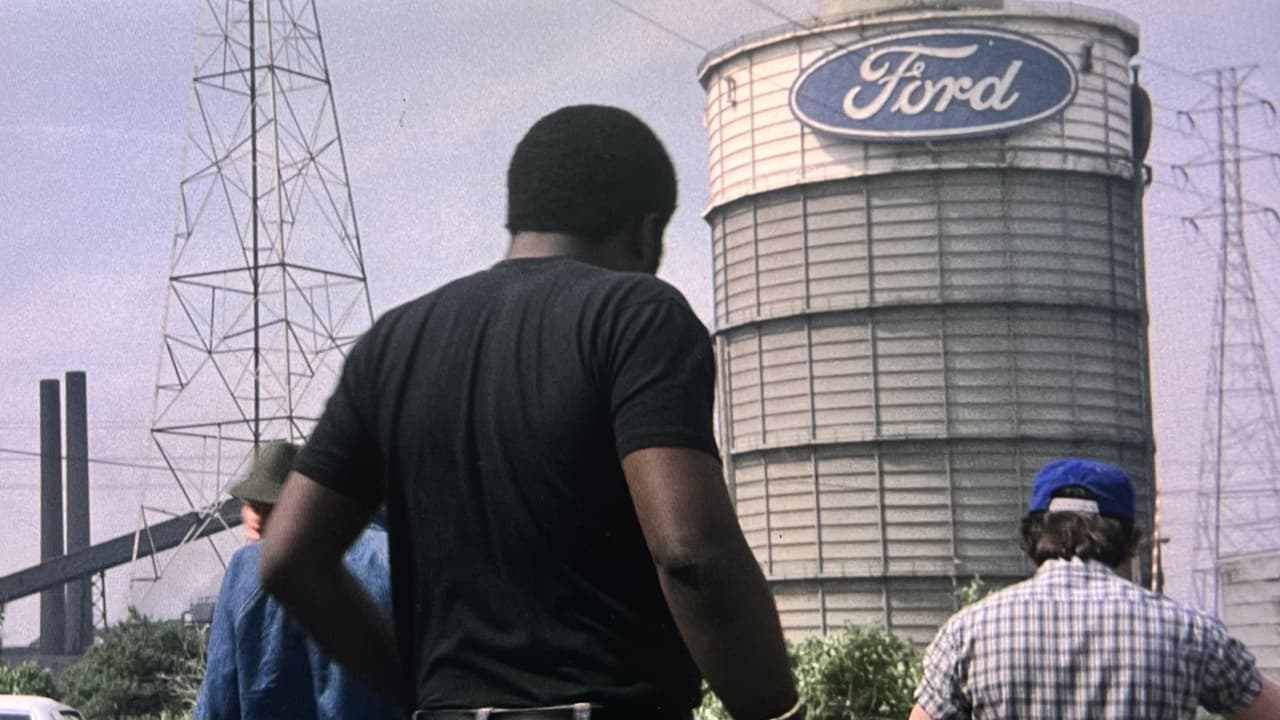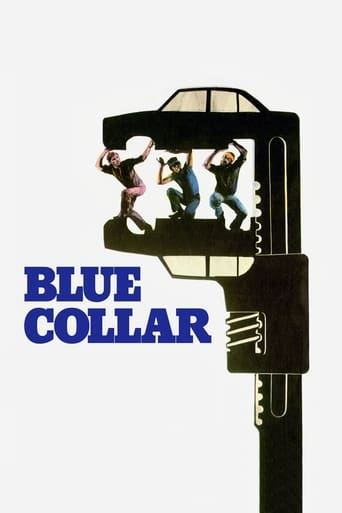

Could one be emboldened to call "Blue Collar" an important and watchable film, but not as great a film as everyone seems to think it is, and that it's obscurity and failure at the box office was not due to the lucid Marxist implications of what was, on paper, a potential masterwork, but that through an author's own misguided execution became something muddy, unfocused, and inert, especially through the neophyte direction of talented actors whose strife-ridden performances lacked the nuance and specific detail to sharpen a didactic political screed into something that was capable of actually emotionally moving the audience rather than just being intellectually admirable? To me, this is the ironic core of the film's own tragic flaw: it lacks the necessary and basic arc of classical dramatic tragedy, because there is no transition between the beginning's complacent discontent and the ending's ignorant discontent; there should be a transition between the beginning's complacent discontent and the various personal flaws in each individual that leads each of them to convince themselves that an act of crime will be a change-agent against corporate evil when it's nothing but it's own reflection, and it is this specific blind spot in each of them, this essential self-delusion motivated by so much justifiable cynicism and hidden psychological suffering, that is not fully explored in any sort of in-depth way, which doomed the film to an affectively barren and arm's-length experience, and short-circuited the heart of it's powerful social criticism. An interesting footnote is that Schrader recently has stated that he doesn't like the film, and has essentially disowned it. It would be interesting to know why, exactly, he feels this way and if it syncs up with any of these particular misgivings. Just off the cuff, here are some further impressions: Keitel's performance generally lacks vulnerability and paternal tenderness, especially in the scene with his daughter's heartbreaking condition; Pryor's performance, although rife with the brilliant and characteristic stylings of his then-dangerous comic persona, fails to convey the more subtle and encroaching shades of corruption that slowly turns a righteous malcontent into a tragically co-opted puppet, and Kotto, who arguably gives the best performance in the film, is too dialed down and laid-back in terms of representing the larger-than-life Rabelaisian spirit of his character's intelligence and Bacchanalian coping mechanisms, and therefore this somehow lessens the horror of his death (even though the nature of his death scene is horrifying in principle) thereby reducing the symbolism of his character as the most potent spiritual threat against the deathtrap of capitalist exploitation, which renders him the figure out of the three main characters to be most fated to an assembly-line martyrdom. All this being said, the film is a respectable and iconic example of what was possible within the non-corporatized mainstream studio system of the late 1970's, a Hollywood as gone with the wind as any lost civilization in history. For that reason alone, it should be cherished and appreciated, and it's nice to see that it has been re-released in a beautifully restored print on Blu-Ray, with much more compelling artwork than even it's original 1978 theatrical release poster.
... View MoreBlue Collar is a criminally under rated classic from writer/director Paul Schrader. This is in my opinion one of his finest works. This is a very compelling and gritty drama with powerhouse performances from Harvey Keitel, Yaphet Kotto and Richard Pryor. This film is much about the struggles of the working man and a look at American society at the time. The film holds up well and much of the themes of the film are relevant today. Very well written and shot, the story flows well and the dialogue and performances are top notch. While the film is about union corruption, it also is a very human story that shows some of the circumstances that corruption manifests itself. There also is commentary on race, class and other issues that are relevant in modern times as well. The film is pretty political and hits on all kinds of social issues, but is never preachy or pretentious and brings this to life in a very real and personal manner. Blue Collar is a very overlooked film that deserves more fanfare and a solid work of 70's cinema.
... View MoreThis movie is an "informing of the methods." It's NOT just about union corruption, because the company is at the core of the corruption. It is comparable to the more recent movie "Devil's Advocate" with Al Pacino as the Devil and Keanu Reeves as his young protégé. The Devil ultimately entraps the young lawyer and like all cases of entrapment by the devil, the devil can not do it unless the victim goes of their own free will. Keanu Reeves character protests angrily and insists that he's not a bad person. Then the devil replays every instance where he TOLD him to drop the case because the client was guilty....he TOLD him to go home to his wife. Of course in each instance he was weak and gave in to evil of his own free will. Blue Collar is EXACTLY the same morality play. It is up to the workers to get involved in their union in a responsible way. It is up to THEM to keep it honest. It is up to THEM to go home to their wives instead of staying out. The corrupt union rep TOLD them to do the right thing...before he offered them corruption. In the end, they did it all themselves...with a little help. The cryptic message at the end summarizes it all and makes it clear that we are being kept at each other's throats and enticed into acting immorally, but how it is our own weakness that plays into the hands of those with evil intentions. But you must watch until the very end...until the message plays. As one commenter said, under-rated film. It's a must see.
... View More"Blue Collar" opens with a masterful title sequence which introduces us, quickly and effectively, to the harsh world our characters reside in and to the nature of the conditions in the factory they work in. The opening sequence is set to Jack Nitzsche's "Hard Workin' Man", introducing blues music to us right off the bat, music that not only makes up basically all of the music in this film but can be seen as a motif or even a character in the film. It's amazing how confident and mature Paul Schrader is as a director at this point. Of course, Schrader had already written the massively acclaimed "Taxi Driver" by 1978, but contrary to what one might expect it's his confident and sure handling of the pace and mood in "Blue Collar" that is truly the highlight of the film, not the screenplay penned by Paul and Leonard Schrader, granted the screenplay is in itself quite terrific. Schrader is already a mature director who understands the rhythm of a film.Going back to the use of music in this film, it isn't so much the score itself by Jack Nitzsche (which is, don't get me wrong, solid blues) that's impressive, it's Schrader's handling of the music and sound in general in this film that makes it work so well. First off, the choice to go with a blues score is inspired in itself, as the nature of the music so perfectly captures what these characters are going through. In addition, the score is most noticeable during scenes where the film appears to be commenting on the futility of the characters' struggle and the misery of what they're going through. Where many films would use music to 'enhance' big, dramatic scenes, Schrader's "Blue Collar" makes the wise decision to use it during low-key scenes. There are several scenes that don't feature any music at all, these being some of the more important scenes. Note the scene where Smokey gets trapped in the paint room, absolutely no music, just the cold sound of the machinery (expertly mixed, might I add), which is far creepier and more effective than any score could be at that point. Similar use of sound occurs a few minutes before the end when Harvey Keitel's character Jerry is being chased.The acting here is uniformly superb with Keitel possibly giving his best performance (or at least one of them), and Richard Pryor offering what must be recognized as one of the finest performances of the 70's by anyone. Really, who knew Pryor had this sort of skill when it comes to dramatic acting? Yapphet Koto, a beloved character actor, does a fine job in rounding out the cast for the main three characters. Again, Schrader must be credited for directing his actors so well. It's well-known, of course, that the three leads hated each other and actually broke out in fistfights between takes on occasion. Perhaps that created a sort of demented chemistry between them.The screenplay by Schrader and Schrader (Paul and Leonard) is a fine, fine piece of writing, sort of the daytime factory-worker version of the crude-yet-poetic "Taxi Driver" screenplay. Oddly enough, it's also the source of the few major flaws in this film, as it can come across as fairly heavy-handed in certain scenes. If there's one thing I'd definitely do differently with this film, it's the final shot, which would have been terrific had this been a comedy.All in all, a great film in its own right and especially impressive as a directorial debut from Schrader. Very memorable.9/10
... View More